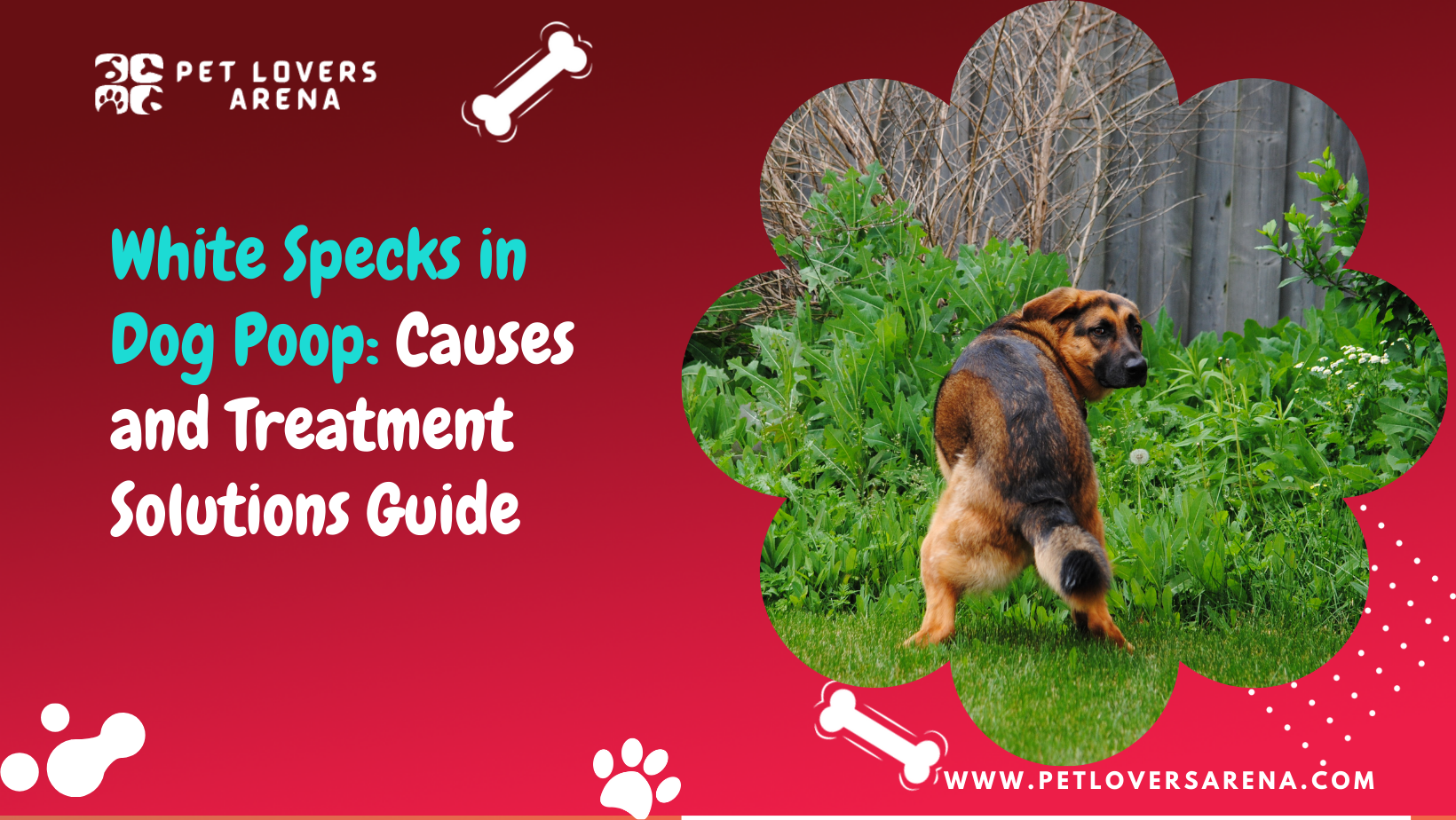Your dog’s poop is an indicator of how your dog’s health is so far. But, unless you become a dog owner, you will never know how important it is to look after your dog and check the dog’s poop.
If your dog has healthy poop, it indicates your dog’s good health, but at the same time, if your dog has white specks in dog poop or smelly poop, it is an indication of some underlying disease.
There is no better way to indicate a dog’s health than by checking his bowel movements and the consistency, color, and frequency of his poop.
If you notice white specks in your dog’s poop, it requires an immediate visit to the dog’s veterinarian, especially the expert in treating dogs of your dog’s breed. This article will discuss the reasons behind the white specks in dog poop, treatment, and other information.
What are the White Specks in Dog Poop?
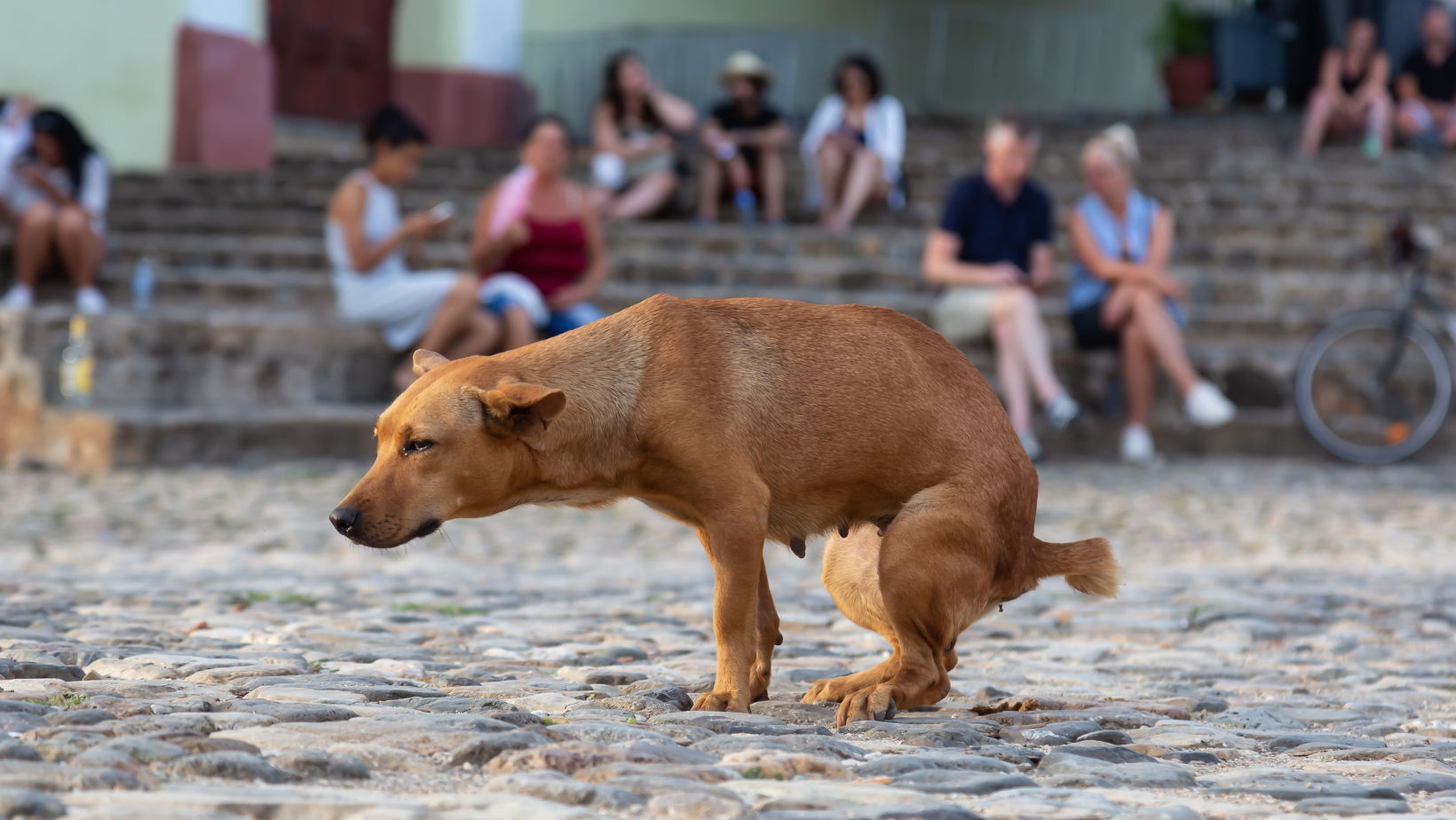
In a dog’s poop, white specks are tiny white dots or lines that appear in a dog’s poop. It is common to notice some white specks in your dog’s poop, but that doesn’t mean you should ignore them. A few white specks are not always an alarming sign, but still considering a veterinarian for this is beneficial.
How Do You Look For White Specks in Dog Poop?
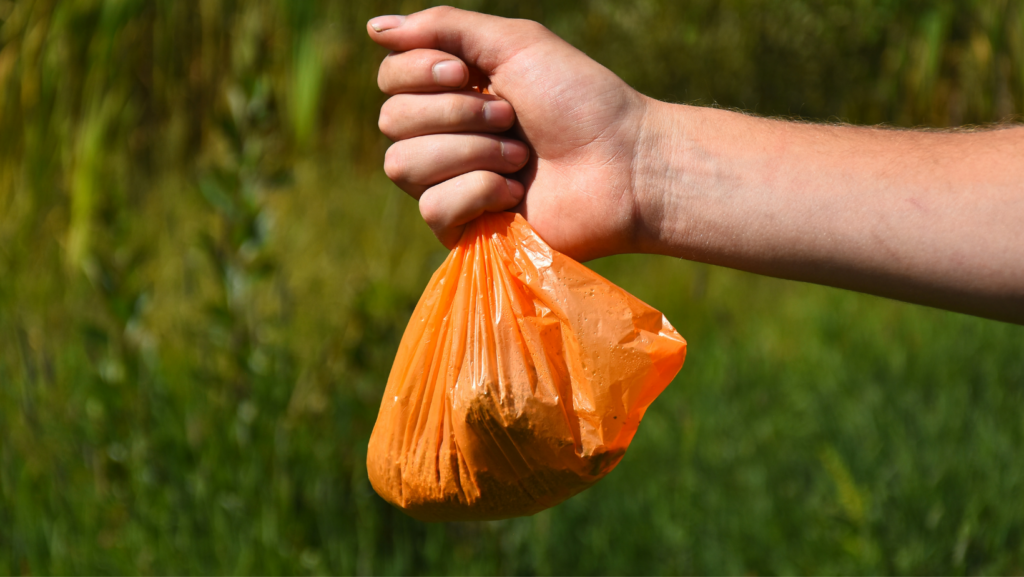
To identify white specks in your dog’s poop, you have to keep a close eye on your dog’s poop. Examining your dog’s poop will help you identify white specks. If the specks are not moving, it might not be a topic of concern. But if you notice the specks moving, it can be dangerous and concerning.
You have to examine the dog’s poop to look for moving specks. After a close examination of the dog’s poop only, you can decide whether it is concerning or not. Sometimes, the white specks don’t move, but they sometimes show a tiny motion. Closely examining a dog’s poop is necessary to notice even tiny movements. Consult the vet if you notice even a bit of motion in the white specks you find in your dog’s poop.
Causes of White Specks in Dog Poop
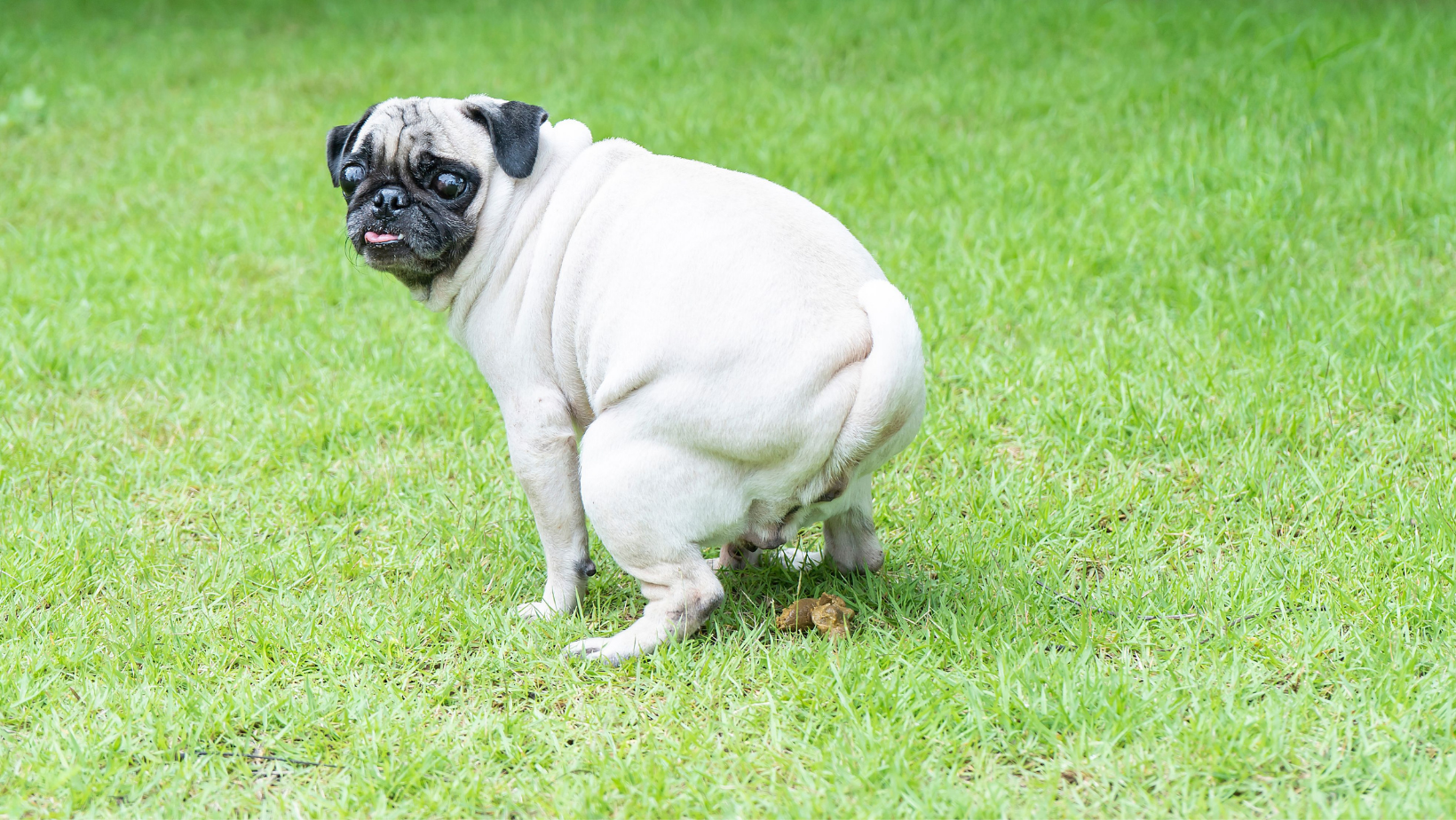
It is not uncommon to notice white specks in your dog’s poop, and there are various reasons why you notice these white specks in your dog’s poop. It can be harmful or harmless. Let’s look at the reasons for noticing white specks in dog poop.
1. Undigested bones
Sometimes owners give raw bones to their dogs. Dogs love to chew on bones frequently. As the bones are rich in calcium and phosphorus, owners give this to dogs. Sometimes bones break into the dog’s mouth as some bones are brittle. The dog’s digestive system does not digest these bones. Dogs remove the bones as they are. The main reason you sometimes notice white specks in your dog’s poop.
If you notice unmovable white specks in your dog’s poop, think of what you have given your dog in the past meal, and it can be bones. Even if you give bones to dogs for chewing, you have to keep a close eye on your dog. When dogs chew on brittle bones, the bone shred can become lodged in their throats, or if they enter the dog’s body, they remain undigested.
If you notice white specks in your dog’s poop and the reason is bones, it’s time to change your dog’s diet. Avoid giving bones to your dog by replacing them with other chewy toys. Keep the lid of your garbage bin tightly closed. Don’t forget to dispose of the bones.
2. Worms in a dog’s body
Worms are one of the most common reasons you notice white specks in dog poop. If you notice the white pecks in your dog’s poop moving, consider going to a veterinarian immediately.
If the white specks in your dog’s poop are moving, there is a high chance your dog has an infection in its digestive system. One important thing to notice is that you have to keep a good eye on your dog’s poop. Sometimes white specks in the dog’s poop keep on moving continuously, and other times it doesn’t move or show tiny movements. In addition, white specks in your dog’s poop sometimes move for a bit and then stop, so you have to keep a close eye on your dog’s poop.
Moving white specks in a dog’s poop can indicate something serious, but they are not the only indicator. If your dog has some serious issues, you will notice vomiting, diarrhea, weight loss, changes in eating habits, etc., in your dog. Be careful if you notice such signs and immediately take your dog to the vet.
3. Undigested Rice
As rice is easily digestible for dogs, many dog foods have rice as their main ingredient. The vet also advises rice for your dog, especially when they have diarrhea. A bland chicken and rice diet are advisable for your dog. But if your dog eats rice in large quantities, it may pass out of the dog’s body without getting digested.
Undigested rice, just like undigested scraps of bones, may pass through a dog’s digestive tract and cause the visibility of white specks in your dog’s poop. It would be best to recall whether or not your dog consumed rice in their last meal to determine the cause. Undigested rice is also one of the reasons you notice unmovable white specks in your dog’s poop.
4. Undigested Pills
Many medicines given to your dog have white color. However, sometimes pills you give to your dog remain undigested, and they move out of the dog’s body. These pills are white, but they are not movable. So, if you notice white specks in your dog’s poop that are not movable, it may be due to some pills your dog has been taking recently.
To identify pills as the reason for noticing white specks in your dog, you have to recall if your dog has been on any medication recently. There are many more reasons, but if the white specks are not movable, it is good for your dog as it isn’t harmful, but you need to consider seeing a vet.
5. Undigested grains
Not only rice, but if you give your dog grains, there are high chances it remains undigested. Undigested grains come out of your dog’s body as it is, without digesting, and it looks like white specks in your dog’s poop.
Usually, if your dog is suffering from diarrhea or has a weak digestive system, there is a high chance that your dog will throw undigested grain out. Undigested grain appearance in your dog is not such a matter of concern, but give your dog food that keeps the dog’s digestive system healthy.
6. Undigested nuts and seeds
Your dog may sneak out some nuts or seeds. Unfortunately, your dog’s body does not easily digest these seeds and nuts.
The unprocessed nuts and seeds are passed out from the dog’s body as such, and they appear as white specks in the dog’s poop. Some common seeds and nuts you will notice in your dog’s poop include corn, sesame seeds, and other small nuts and seeds.
As dog food brands know that these things are not preferable for your dog, they are not present in your dog’s food. Finding these nuts and seeds in your dog’s poop is a sign of your dog getting them from either sneaking out or some other way. Find the reason and source, and keep it away from your dog.
Keep an eye on your dog to notice that they are not eating any dirty or harmful things. For example, check that your dog is not eating nuts and seeds as they are not digestible. So rest, noticing white specks in your dog’s poop due to nuts and seeds is not always harmful.
7. Some undigested chewy toys or plastic
We know dogs love to chew on things. However, chewing on bones can be dangerous for dogs, so owners usually replace them with chewy toys. But most likely, some part of the chewy toy will also get inside your dog’s body. Not only this, but sometimes dogs chew on plastic, which is also not digestible by your dog.
These plastic and chewy toys remain undigested in your dog’s body and get out of the dog’s body as it poops. Unfortunately, plastic and chewy toys are also the reason for the white specks that appear in your dog’s poop.
8. Flies’ larvae
You should immediately dispose of your dog’s poop once it is done. However, if the waste stays there for a long time, the waste attracts flies, and this causes many problems.
Flies like to give eggs on waste, and if your dog’s poop is not disposed of and kept for a long time, it will attract flies. Flies lay their egg or larvae on dog poop, and they appear as moving white specks to the naked eyes.
Before you panic after noticing moving white specks in your dog, ask yourself how much time it has been since your dog has pooped and you have not disposed of your pooch’s poop.
Read More: Why Won’t My Dog Poop Outside? 8 Ways Training To Poop Outside
Treatment for White Specks in Your Dog’s Poop
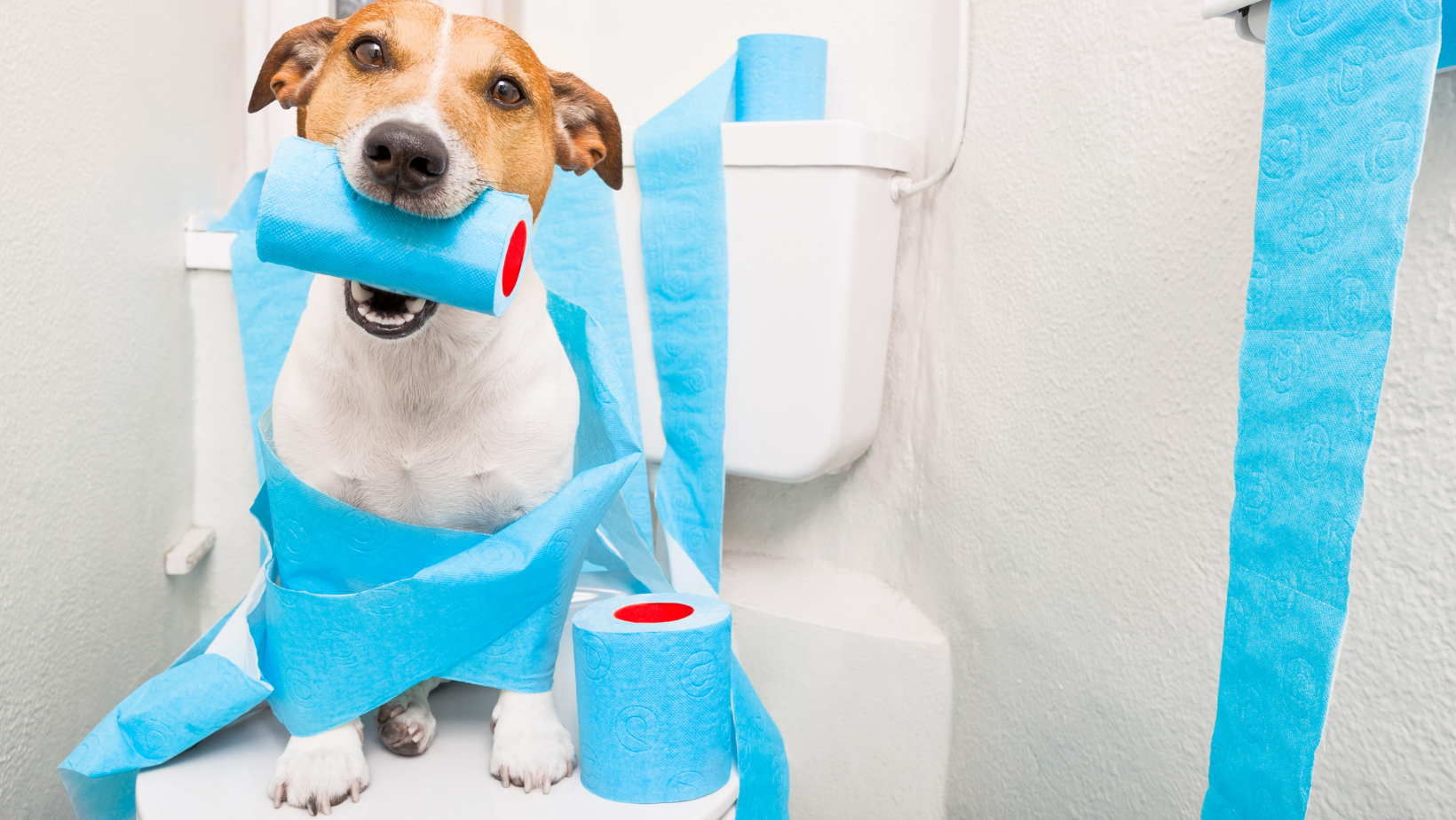
Dog’s poop may contain moving or Unmoving white specks. So you have to be careful whether your dog’s poop contains moving white Specks or Unmoving white Specks, and then provide your dog the treatment.
Unmoving White Specks
If you notice unmovable white specks in your dog’s poop, it may not be the cause of some serious issues. Unmovable white specks are normal in a dog’s poop. It can be due to undigested rice, undigested bones, pills, seeds, grains, or other such things. You have to check the reason and replace it immediately.
- For a change in diet, consider going to the vet.
- Consider changing your dog’s medication by considering the dog’s veterinarian’s advice for a change in pills.
- Give a small portion of the rice diet to your dog.
Moving White Specks in Your Dog’s Poop
Moving white specks in your dog’s poop is a matter of concern. Moving white specks in your dog’s poop can be due to worms or other parasites. Here are some treatments for your dog’s poop infection due to worms.
Roundworms
Roundworms are common, especially in puppies. Roundworms have an appearance like long white spaghetti. Roundworms grow in the dog’s stomach, eating your dog’s food before it gets digested.
A roundworm infestation in dogs is not fatal generally. However, it can be fatal if your dog suffers from continuous vomiting, gastrointestinal problems, diarrhea, etc.
Roundworms often enter your dog’s body by your dog eating infected poop. Therefore, cleaning the poop of your dog is important. Small puppies often get infected by roundworms through their mother if the mother dog is infected. If the roundworms are strong, they grow very quickly because their reproduction power is strong.
Mostly, your dog gets roundworms from its surroundings by sniffing and licking the area where other infected animals have pooped. If your dog eats small animals such as mice with roundworm infections, your dog can develop this infection of roundworms.
The small animals your dog eats are only parasitic hosts for roundworms. Roundworms don’t get mature in small animals, but when roundworms move to the bodies of dogs, they get mature, and just like this, the life cycle of roundworms continues.
Symptoms of roundworm in your dog’s stomach
If a roundworm infects your dog, you will notice their poop is stringy and spaghetti-like worms in their poop. Spaghetti-like roundworms can be either brown or white.
Roundworm infection in dogs can have other symptoms also. These include diarrhea, abdominal pain, vomiting, loose stool, and irregular bowel movements. In addition, you will notice your dog getting extremely weak and suffering from malnutrition, even if you feed your dog fully.
Treatment
Be careful while handling your dog suffering from a roundworm infection, as roundworms can easily infect humans.
If you find your dog infected by a roundworm, immediately consider going to a vet. Your dog’s vet will give deworming medications to your dog. Your dog should follow this medication for a week or until it recovers. After your dog’s recovery from the roundworm infection, you also have to examine the dog’s poop for a year or so.
Tapeworm
Tapeworms are the kind of creatures that live in your dog’s stomach and eat the food your dog eats. Your dog, if infected with tapeworm, suffers from weight loss. Most of the time, dogs get infected by tapeworms after consuming fleas. Giving oral medication to kill fleas in your dog is beneficial. Rest. It would be best to take your dog infected by tapeworm to a veterinarian.
Symptoms of a dog infected with tapeworms
You can tell if your dog is infected by tapeworm only by noticing tapeworm fragments in your dog’s poop. These tapeworm fragments are moving white specks that appear in your dog’s poop.
The small fragments of tapeworm that appear in your dog’s poop are proglottids. As tapeworms grow in the dog’s stomach and intestine, the proglottids appear in your dog’s poop.
Proglottids are approximately the size of a grain of rice. These fragments that appear in dogs’ poop contain tapeworm eggs, and these eggs that pass through the dog’s poop spread into the surroundings.
In some cases, due to heavy tapeworm infestation, you will notice your dog suffering from weight loss. You will also notice your dog dragging its butt or licking its whole body. Many dogs don’t show any symptoms of tapeworm infestation, but those mentioned above are common. Passing out tapeworms in dogs’ poop can cause infections in dogs, irritate your dogs who scratch their butts, and cause other major issues.
Treatment of tapeworm infections
Your veterinarian will give your dog some medications that kill tapeworms in their bodies only. The killed tapeworms will be removed from the dog’s body by looping them out.
Your dog should follow the proper course of medication as given by your dog’s veterinarian. If the proper course of medication is not followed, the risk of tapeworm not dying increases. Rest, you should often check for tapeworm infestation in your dog’s gut. If tapeworm infestation in dogs is left untreated, it causes serious health problems for your dog. Dogs may die from untreated tapeworm infestations as tapeworms rob all the nutrients from your dog’s food.
Taking proper preventive measures to stop the infestation of tapeworms in dogs will also help your dog.
Hookworms
Hookworms are more like roundworms. They enter the dog’s body and hook onto the dog’s intestines with the help of their hook-like mouth. Instead of feeding on dogs’ food, hookworms feed on dog blood.
Hookworms are small, but they are considerably more dangerous than roundworms and tapeworms. Although hookworms are small in size, they can suck out a great amount of blood from your dog’s body. The loss of blood from your dog’s body can cause your dog anemia and other health issues that can be fatal.
Hookworms are common in puppies. Usually, dogs get infected by hookworms orally or by contracting hookworms from mother dogs. But sometimes, dogs tend to get infected by hookworms through their skin. For example, if your dog rolls up on the poop, hookworms from the dog’s poop or other animals’ poop can get attached to your dog’s skin. This causes further problems related to hookworm in dogs.
Symptoms of hookworm in your dog
Although it is not easy to guess that the small dots or white specks you notice in your dog’s poop are only hookworms, you can look for some symptoms that give you an idea.
Some common symptoms that you may notice if hookworms infect your dog are extreme weight loss, pain in the dog’s stomach, blood in the stool, the dog’s coat is turning dry, the growth of your dog, and others. In severe cases, you will notice your dog’s continuous coughing.
Blood loss in dogs is a symptom that is problematic for dogs. However, noticing anemia and non-coagulation of blood in your dog is also a hookworm infestation. Along with this, you may notice weakness and pale gums in dogs.
Treatment for dogs infected with hookworms
Detecting hookworms in your dog is not easy. A hookworm in a dog’s poop is as small as a sesame seed. Thus, your dog’s veterinarian will easily detect hookworm in your dog, but it cannot be easy for you. Therefore, a lab test is preferable for detecting hookworm presence.
Your dog’s veterinarian will suggest many treatments for your dog’s suffering from hookworm infestation. But all the treatments available kill adult hookworms only. It is not easy to kill the larvae of hookworms. Your veterinarian will advise your dog to follow the proper course of medical procedure. Make sure your dog follows the proper medical procedure. As suggested by the veterinarian, the medical procedure or medications are for a long time. It is not easy to easily treat this infection disease caused by hookworm, so it takes time.
Besides this, heartworm medications will also be helpful for your dog suffering from hookworm infestation. But considering a vet’s advice is always the first preference.
Infections by other worms
It’s completely justified for you to be worried about other worm infestations in your dog’s system and diseases caused by these worms. Worms like whipworms, heartworm, and others are small in size. These worms are not visible to the naked eye. Such small worms can be detected in labs only.
If you suspect your dog is infected due to small worms such as whipworms, immediately consult a veterinarian. Your veterinarian will run a proper blood test and inform you about the presence of such worms. Thus, it would be best to take your dog to the vet for regular checkups to avoid any problems.
Another reason for white specks in your dog’s poop is fly larvae. Before the fly gives larvae on your dog’s poop and causes you to worry, immediately dispose of your pooch’s poop. Disposing of a dog’s poop is extremely necessary as it causes problems if not done so.
Final Words
There are numerous reasons you might notice white specks in your dog’s poop. The reasons can be worms, undigested food, flea larvae, etc. If white specks in your dog’s poop are not movable, you should not worry much. But if white specks in your dog’s poop move, it becomes worrisome.
Several treatments are available for your dog, who has white specks in its poop. However, considering a veterinarian will always be the first preference, unnecessary panicking will not provide a solution. So keep your patience and follow the proper treatment process as suggested by the veterinarian. It will take some time, but you will again notice your pooch is normal.
Meet Madison Phillips, your compassionate guide to pet well-being. With experience from VCA Animal Hospitals and Laxton Vet Clinics Bellaire Inc. Madison honed her skills and embraced the balance of medical expertise and compassion, through her articles, she simplifies pet care, whether you’re a newbie or an experienced pet parent.

